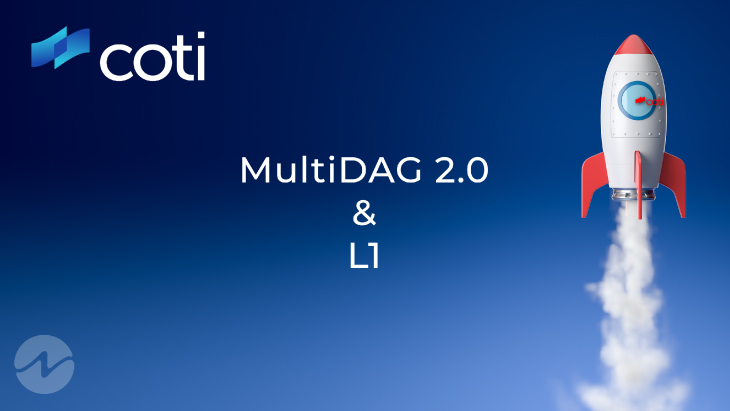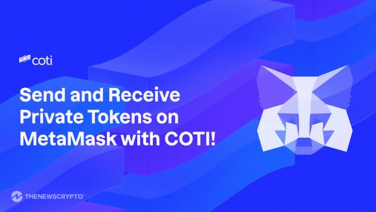COTI has said this will be the year it finally surpasses the merchant payment processor networks like Visa, Mastercard and PayPal that it’s aiming to replace.
In its newly published roadmap for 2022, COTI – which stands for “currency of the Internet” – said it’s aiming to launch its MultiDAG 2.0 Layer Mainnet in the second half of the year. With that, its ecosystem will expand from supporting just one digital token, its native cryptocurrency $COTI, to multiple tokens whose value will be pegged to traditional fiat currencies.
This is all part of COTI’s ambition to enable businesses to issue their own branded stablecoin cryptocurrencies, something that it believes will give its payments network the edge over rival platforms and speed up its adoption.
The idea is that businesses will be able to transact in their own branded stablecoins. That will enable them to adopt cryptocurrency for merchant and retail payments, avoiding the transaction fees associated with traditional payment platforms. While crypto has long-promised to enable this, businesses have until now proven averse to transacting in digital currencies such as Bitcoin and Ethereum due to their extreme volatility – but with stablecoins, that will no longer be an issue.
COTI’s MultiDAG 2.0 Layer is the key enabler in more ways than one. Besides enabling companies to issue tokens, it’s also the secret sauce behind COTI’s incredibly fast transaction speeds. DAG stands for “directed acyclic graph technology” and is an alternative to the blockchain, which is hampered by its need to process transactions in blocks – one after another. This causes blockchains to be incredibly slow. Bitcoin for instance, can only process seven transactions per second, while Ethereum is not much better, only able to process 15 TPS.
In contrast, COTI’s DAG architecture stores transaction data in a graph model that can grow exponentially, allowing it to process multiple transactions at the same time. As a result, COTI claims it can handle up to 100,000 TPS without breaking a sweat. That’s superior even to Visa, and gives COTI’s network more than enough speed to handle the needs of business and enterprise customers. At the same time, COTI claims that its fees are much cheaper than Visa, which charges between 2.87% to 4.35% on most payments.
Enterprise Stablecoins
In its roadmap, COTI said the plan is to launch MultiDAG 2.0’s Testnet in May, before the Mainnet goes live sometime in the third quarter of this year. At the same time, COTI will also update its Trustchain Explorer and Bridge to support the new version of DAG.
Assuming those updates all proceed without a hitch, COTI will be able to launch its unique “coin-as-a-service” feature later this year, meaning its enterprise customers will be able to mint new tokens based on the COTI standard and peg them to an asset of their choice. So a U.S. based firm could launch its own stablecoin pegged to the dollar, while a company that does business in Europe would likely choose the Euro, and a Japanese firm could opt for the yen.
For companies, the main benefits of having a COTI-based stablecoin include the flexibility to issue as many tokens as they need to support their business, technical support and privacy modules designed by COTI, lower transaction fees and high scalability, COTI said. It’s an idea that at least some firms believe has merit, as COTI has already been working with one major, but so far unnamed enterprise client for over a year on the launch of its first stablecoin. COTI said the first enterprise token will launch towards the end of the year, and at the same time it will publish a comprehensive case study on the initiative, which it hopes will open the floodgates to hundreds of other new enterprise stablecoins.
Companies that use COTI’s existing COTI Pay Business product will also gain the ability to use COTI-native tokens for any business transaction, be it retail or merchant.
Djed & Shen
While stablecoins are the biggest deal for COTI’s enterprise clients, a couple of new tokens called Djed and Shen could have a much bigger impact on the Cardano ecosystem. Cardano is one of the biggest blockchain projects of all and its $ADA token is one of the top ten most valuable cryptocurrencies in terms of its market cap.
Djed will be Cardano’s first algorithmic stablecoin and widespread adoption is expected, as it will play a key role in eliminating transaction fee uncertainty as people send tokens across Cardano’s ecosystem. Shen meanwhile is designed to be Djed’s algorithm-based reserve coin, which has the role of enabling Cardano’s community to provide the liquidity needed to support Djed’s 1:1 peg with the U.S. dollar. As such, Shen holders will be incentivized to stake their tokens to provide that liquidity, earning rewards when they do so.
Popular Cardano-based decentralized apps including AdaSwap, DOEX, ErgoDEX, SundaeSwap and Indigo have already announced plans to integrate with Djed and Shen, both of which are set to launch days after MultiDAG 2.0’s Mainnet does.
COTI Treasury Governance
There’s good news on the way for COTI’s community too, as the network is planning to expand the functionality of its new Treasury and introduce community-led governance.
Launched in February, the COTI Treasury has the function of collecting rewards from the wider COTI ecosystem and then distributing them for the benefit of the community and its ecosystem. It has already received more than 330 million $COTI tokens since launching. $COTI token holders can receive a share of those rewards by staking in the Treasury’s pool, while the remainder of the funds is used to support projects voted on by the community.
With MultiDAG 2.0 enabled, COTI said it will launch its COTI Treasury governance token in the third quarter. It will actually be the first COTI-native token to go live, ahead of Djed and enterprise tokens, COTI said. The governance tokens will be distributed via an airdrop to members of the community who have staked tokens in the Treasury pool, as well as other members who have worked to grow COTI’s ecosystem. With the governance coins, holders will be able to vote on changes to the network, debate and even introduce proposals themselves.








